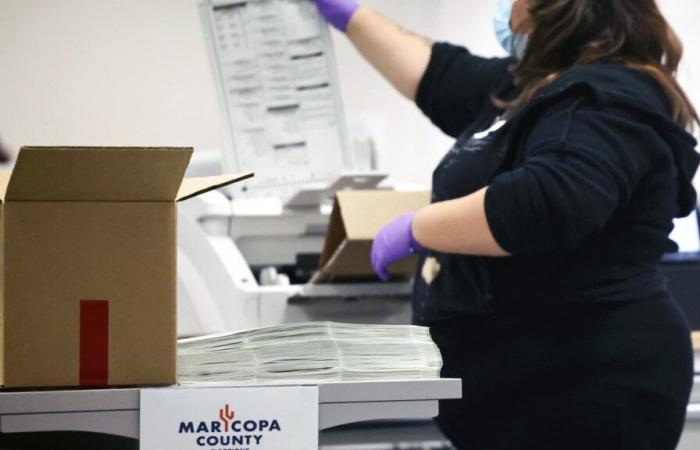Donald Trump was declared the winner of the presidential election the day after the election, Wednesday, November 6, even though all the ballots had not been counted. This Friday, November 8, the result has still not been given in the key state of Arizona.
Nearly 48 hours ago, Donald Trump was declared the winner of the US presidential election against Kamala Harris. However, on this Friday, November 8, the counting is still not finished. Seen from France, it seems strange to proclaim a result when not all the ballots have been opened, but in the United States, the electoral system changes the situation.
A count that takes time
Indeed, Donald Trump had won more than 270 voters out of the 538 in total, as of Wednesday, November 6 – the day after the election – shortly before 12 p.m. (Paris time). This is the course to be proclaimed winner.
But this Friday, November 8, the process is still underway in Arizona. We still do not know who, Kamala Harris or Donald Trump, won the 11 electoral votes in this key state, a state which easily switches between the Democratic and Republican camps. Only 74% of ballots have been counted in Arizona, according to CNN.
Unlike France, the counting takes a very long time in the United States and it is not uncommon for it to take several days. In 2020, it took more than three days before Joe Biden passed the threshold of 270 voters against Donald Trump.
It is in particular the increase in postal voting which is slowing down the counting. As recalled by New York Timesit takes longer because it has more steps: First, there are additional checks to ensure that the voter has not also sought to vote in person.
Then, those responsible for counting them must open the ballots and flatten them (because they have been folded) before they can place them in a tabulator to count them. Some officials are advocating for authorization to open and flatten ballots in advance, but this is not yet authorized.
The count, however, took less time than in 2020, during the Covid-19 pandemic, because fewer people voted by mail and the polling stations gained experience.
If Arizona will not change the result of the election – Donald Trump already has 301 voters – it is nevertheless obligatory to go through with the process. The electoral college, i.e. the 538 electors, must be complete on December 17 to in turn elect the next president.
The country’s 3,000 counties have a prior deadline: they must certify their official results before December 11. Some key states even have shorter deadlines. Georgia, for example, must certify its final count by November 22, while Michigan and Pennsylvania have until November 25. These three key states were also won by Donald Trump: he won a total of five “swing states”.
Multi-page newsletters
If the vote count is so long, it is also because Americans were not asked to vote only for their future president. In several states, the ballot paper is several pages long because American voters had to decide on a whole bunch of other subjects. Starting with the members of Congress: all of the seats in the House of Representatives are renewed as well as 33 senators’ seats.
Currently, 23 representative seats have not yet been officially allocated, with counting still underway. CNN estimates the number of votes remaining to be counted at 1,900,000, mainly in California. Americans do not yet know whether the Lower House will be controlled by the Republicans or the Democrats. Even if Donald Trump’s party seems to be on the right track: they have currently won 212 seats against 200 for the Democrats. You need 218 to have the majority.
Election night told by our reporters
In the Senate, the fate has already been sealed. From this Wednesday, November 6, the country knew that the upper house was falling into the hands of the Republicans. The Grand Old party has 52 seats out of 100. The count for four seats is still in progress. Note that if the Republicans have control over the entire Congress, Donald Trump will have great room to maneuver to pass his reforms.
In several states, it was also possible to vote at the same time for a secretary of state, a governor, an attorney general, a judge, directors of transportation departments or even sheriffs.
All this without counting local referendums or proposals for local laws or policies. In several states, residents were invited to express their views on the right to abortion.






